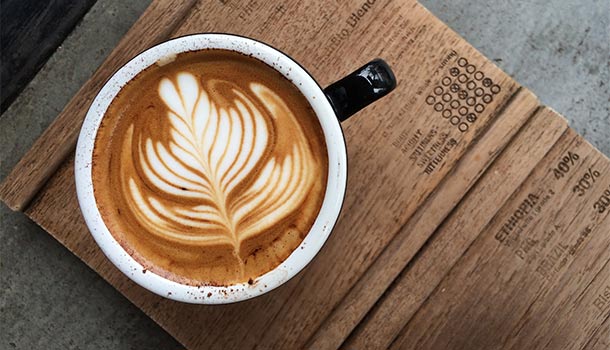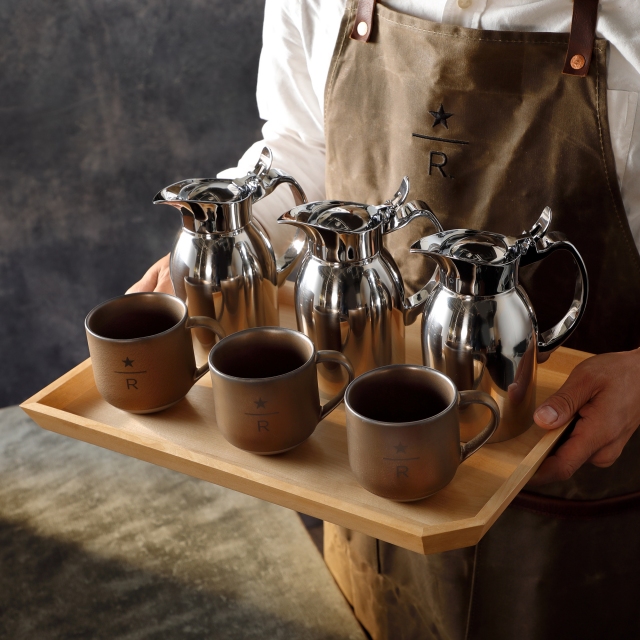A brief History of Coffee drinking: why Coffee has become the "spiritual poison" of contemporary urban youth?
Professional coffee knowledge exchange more coffee bean information please follow the coffee workshop (Wechat official account cafe_style)
It is one of the common poisons in Conan Doyle and Agatha Christie's detective novels, the inspiration "muse" of geniuses such as Beethoven and Van Gogh, and the soul mate of Balzac and Voltaire. It is said that the Apollo 13 spacecraft, which made its third manned landing on the moon, broke down on the way and was at a critical moment of life and death. The words that the ground personnel comforted the three astronauts were, "come on!" Delicious hot coffee is waiting for your return. "
I'm afraid it's hard to find a drink in the world that has so many fans and enthusiasts. Today, coffee, together with stroking cats and fitness, has become a "spiritual poison" for contemporary urban youth. It is not easy to refuse it justifiably.

Although there is no textual research on the earliest recorded history of coffee, a story has proved that the charm of coffee has existed since ancient times. Around the 6th and 8th centuries, monks at a mosque in Yemen found sheep returning at dusk like drunken sheep and found the fruit of a magical plant that could help them regain their consciousness during night prayers. They named the magical water "kawah", which means "exciting and ecstasy".
In the 17th century, coffee remained a prescription drug in Europe, and doctors found that it could speed up blood circulation and kick alcohol addiction. For ordinary citizens who love wine and beer, this expensive drink from the east is a "health product" that only upper-class society is entitled to drink.
In his book Global Addiction: how Coffee stirs up Human History, German writer Heinrich Edwards Jacob observes that coffee has also been in a state of shouting. The first cafe built in Marseilles following the example of the East challenged the authority of local doctors and winemakers and set off a boycott of coffee. The Marseilles doctors Association asked in public interviews, "is drinking coffee harmful to the health of the people of Marseilles?" The standard answer card in the hand of the examiner says, "drinking coffee is harmful!" A French princess died of stomach cancer. Several black ulcers were found while dissecting her stomach, which was rumored to be the deposition of black coffee grounds. It is even more bizarre to say that because husbands spend all day in cafes, women denounce that coffee makes men cold.
This did not affect the powerful charm of coffee: it is said that Louis XV was obsessed with coffee and that making coffee by hand was his highest etiquette for entertaining guests; Harvey, the discoverer of blood circulation, made a will to give 56 pounds of coffee beans to the doctors' Association of London. Beethoven counts out 60 coffee beans to make coffee every morning before he can work until the afternoon. Balzac gets up in the middle of the night and works until 8 o'clock in the morning. He is said to drink 50 cups of coffee a day.
Many people believe that the reason why coffee is "addictive" depends entirely on the efficacy of caffeine. In 1820, Langer, a German chemist, first extracted caffeine from it. This kind of small molecule can block the "glandular Gump" in the human body to release fatigue signals, as if through the governor's second pulse, so that people's theoretical working time can be extended to 24 hours.
But in fact, if there is no coffee shop, the soul of coffee can only be limited to two or three friends, one side of the house. The cafe was the place where the citizens of Paris in France first experienced public life in the 18th century, and it was also the sacred place where the dawn of the European revolution appeared in the middle of the 19th century. For the first time, it breaks the class separation line between people and makes it possible for the exchange and collision of ideas.
In Paris, France, at the beginning of the 18th century, there were 380 cafes alone. Whether you are an amorous scholar, a lady, a monk, a soldier, a countryman, a glutton, etc., you can sip coffee and talk about it here.
The cafe next to the Happy Theater is a "lounge" for actors, playwrights and critics, full of gossip and self-boasting; the cafe next to the civic center brings together businessmen, jurists, doctors and congressmen. Wigs symbolizing status and status are filled with the aroma of coffee; what is most indispensable is, of course, cafes where literati and music lovers gather. But the philosopher Russo's favorite patronage is a cafe known as "as quiet as the underworld".
Shanghai was called "Paris of the East" in the 1920s and 1930s, and cafes were also indispensable. As one of the civilized imports brought by the Western colonists, the cafe became a high-end consumption place at that time as more and more students and scholars returned from abroad and the children of rich families were elegant. According to incomplete statistics, by the mid-1930s, there were 125 caf é bars and bars on both sides of Xiafei Road. By June 1946, there were said to be 49 cafes in Shanghai.
However, Lu Xun published a public article criticizing a "revolutionary coffee shop" with "meeting Lu Xun and Yu Dafu" as a publicity stunt. He denied that he had been to the coffee shop and wrote, "Coffee shop, I only heard that you can watch both dancers and maids to feast your eyes. Who would have thought that this time it was a 'celebrity', giving people 'lessons' and performing all kinds of fun tricks like 'talking' and 'meditating'? it was simply a paradise of reality. "
However, it is probably this boastful manner that Lu Xun hates. After that, he often went to a "public coffee cafe" run by foreigners, which was not only the position of the Leftist League meeting, but also received Rou Shi, Xia Yan, Xiao Jun and Xiao Hong. Because Chinese people generally go less to discuss current affairs and environmental security.

After the reform and opening up, cafes have re-entered China, but it is a different picture. The first Starbucks cafe in China opened in 1999, but the price of a cup is equivalent to the price of 1x90 per square meter in Beijing, which deters ordinary people.
I first came into contact with the word "coffee" when I was reading the first volume of New concept English in primary school. Drinking black coffee with biscuits became my yearning for life. In the small county town at that time, there was only one coffee shop called "left Bank Coffee". In my eyes, it was a place where "people with status and status" were eligible to enter.
At that time, it was more popular to use "Nestle brand" instant coffee as a gift. A bottle of instant coffee could be drunk for a year, and the large jar left behind was the best choice for pickles. But even so, curious children still have no chance to try, because adults will solemnly refuse: "Children can not drink coffee, will be addicted."
Today, coffee has long gone from a luxury forbidden to children to a "necessity" for many friends who work overtime. A friend who must drink a cup of coffee every day told me seriously, "when I smell coffee, my soul is sublimated."
The cafe is no longer a classy place, it has become a rest place after work, or even a vent for a temporary escape from the heavy life. Entrepreneurial cafes are a good place to enjoy free desks, Wi-Fi and air conditioning, cat cafes are full of cat smokers who have failed to raise cats, and chain cafes are full of business businessmen, homework children and experience-sharing mothers.
According to the latest BBC report, a new round of coffee crisis is coming. Brazil, the world's largest coffee producer, has a persistent surplus, affecting the world coffee market and driving down already low prices. For growers, they may not be able to pay for school and health care.
But most of the time, these stories never reach the ears of CBD white-collar workers. It is said that the latest popular chain of disdain in office buildings belongs to the coffee circle: drinking freshly ground hand-made disdain for drinking bagged instant; drinking concentrated American-style contempt for drinking mocha lattes; and the humble coffee maker in the office pantry. Can only leave the "cottage" the last bit of sober dignity.
Source: China Youth Daily
END
Important Notice :
前街咖啡 FrontStreet Coffee has moved to new addredd:
FrontStreet Coffee Address: 315,Donghua East Road,GuangZhou
Tel:020 38364473
- Prev

The definition of fine coffee in the domestic market
Professional coffee knowledge exchange More coffee bean information Please pay attention to coffee workshop (Weixin Official Accounts cafe_style) specialty coffee is also called special coffee selection coffee. It refers to coffee made from green beans with excellent taste characteristics grown in a few extremely ideal geographical environments. Depending on the particular soil and climatic conditions in which they are grown, he
- Next

Kenyan Coffee touching Story of Kenyan Coffee the impact of Kenya's climate on coffee
Professional coffee knowledge exchange more coffee bean information please follow the coffee workshop (Wechat official account cafe_style) when you say "Kenya", you think of the African prairie and the animal migration, is there anything else? The coffee-loving editor immediately thought of mellow coffee. Kenya is the largest coffee-producing area in East Africa, and it is also a representative term for fine coffee. Even Starbucks sells Kenyaca.
Related
- What grade does Jamaica Blue Mountain No. 1 coffee belong to and how to drink it better? What is the highest grade of Blue Mountain coffee for coffee aristocrats?
- What are the flavor characteristics of the world-famous coffee Blue Mountain No. 1 Golden Mantelin? What are the characteristics of deep-roasted bitter coffee?
- Can I make coffee a second time in an Italian hand-brewed mocha pot? Why can't coffee be brewed several times like tea leaves?
- Hand-brewed coffee flows with a knife and a tornado. How to brew it? What is the proportion of grinding water and water temperature divided into?
- What is the difference between Indonesian Sumatra Mantinin coffee and gold Mantinin? How to distinguish between real and fake golden Mantelin coffee?
- What does bypass mean in coffee? Why can hand-brewed coffee and water make it better?
- Unexpected! Ruixing Telunsu lattes use a smoothie machine to foam milk?!
- % Arabia's first store in Henan opens into the village?! Netizen: Thought it was P's
- Does an authentic standard mocha coffee recipe use chocolate sauce or powder? Mocha Latte/Dirty Coffee/Salty Mocha Coffee Recipe Share!
- What is the difference between Vietnam egg coffee and Norway egg coffee? Hand-brewed single product coffee filter paper filter cloth filter flat solution!

